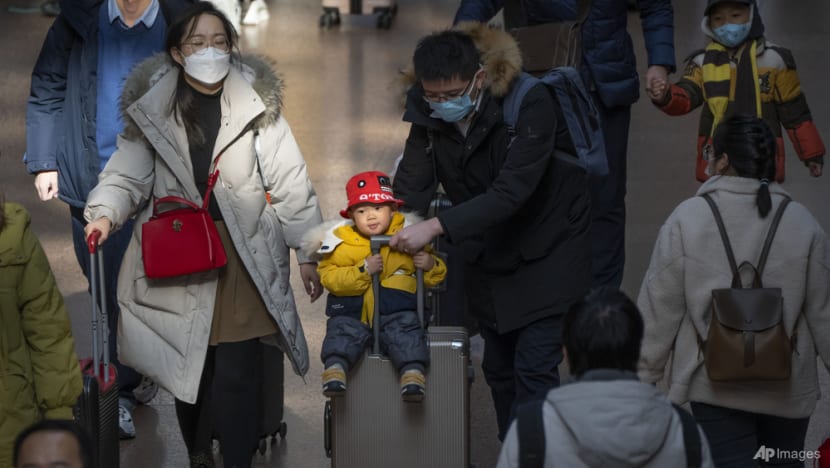Commentary: China’s population decline - Chinese women make a strong case with a ‘birth strike’
Like women the world over, Chinese women are no longer so willing to birth and bring up children. The choice is a rational response to the emotional and material costs of raising them, says the Financial Times’ Yuan Yang.

LONDON: Two decades ago, the International Wages for Housework Campaign called for a “Global Women’s Strike”. “We do the work of giving birth to, feeding and caring for all the people in the world,” the campaign declared. “But this work is devalued & demeaned.”
Women from 64 countries joined the day of action, but notably none from China. In a country where feminist actions have been shut down by arrests, Chinese women are not generally protesting on the streets. Instead they are quietly quitting in their homes.
On Tuesday (Jan 17), the government announced that China’s population has started to decline for the first time in 60 years. Historically, the slowdown in fertility can be linked to the punitive one-child policy enforced from the 1980s, which the government only ended in 2015.
Demographers say that the slowdown would have happened anyway, without the brutality and forced abortions of the policy, due to urbanisation and increases in income.
The best explanation for the falling birth rate is the simplest: Like women the world over, Chinese women are no longer so willing to birth and bring up children.
COSTS OF RAISING CHILDREN
“From buying a house to getting married, from prenatal education to extracurriculars, from primary to secondary school, from university to employment, from helping them get married to helping them raise kids, every step makes the spirit weary,” writes Tsinghua University sociologist Sun Liping.
In other words, the choice to desist from having more children is a rational response to the emotional and material costs of raising them.

Related:
The government clampdown on private education companies in 2021 was partly a recognition of these sky-high costs — except it treated the symptom, rather than the cause. The fear of losing out in a polarised labour market drives intense competition for scarce educational resources among parents.
CHILDCARE AND WORKPLACE DISCRIMINATION
Low fertility is a problem for an economic model that relied on mass labour to fuel low-cost manufacturing. But China’s government says it is past this point. Instead, it wants “high-quality growth”.
For that, it needs to build social infrastructure, particularly in early-years care in rural areas, where over a third of China’s preschoolers live. As one Beijing-based sociologist puts it: “If you really treated children as the future wealth of the country, you’d invest in them.”
The Communist Party is no stranger to what this provision could look like. Urban women of my own generation complain that our parents had it easier.
Before the state-owned enterprise reforms of the 1990s, children whose parents belonged to “work units” were guaranteed childcare from the age of two onwards. At 8am on work days, my grandparents took me to the local kindergarten, whose hours were timed with the factory’s shifts.
Workplace discrimination against potential mothers is also rampant. Each relaxation of the one-child policy has proved unpopular, despite on the surface providing more bodily autonomy.
Instead, women feared they would be suspected by their employers of harbouring gestational ambitions.
EXPECTATIONS OF DUTY
Feng Yuan, a veteran Chinese feminist activist, sees an opportunity in this moment: “The government knows it has to be better to women; yet it doesn’t listen to them.” The term “birth strike”, as used by Korean and American feminists such as the author Jenny Brown, is a way of turning low fertility into a rallying call for better conditions.
In its focus on gross domestic product growth, Beijing has forgotten that the economy is made up of humans, who also need producing.
So far it has expected this work to be done out of duty. “The CCP’s official speeches emphasise that women should be responsible for caring for the young and old,” says Yun Zhou, an assistant professor of sociology at the University of Michigan.
Such speeches are useless in affecting a rise in birth rates. If over two millennia of Confucian teaching about the woman’s place in the home won’t do it, I don’t think any publicity campaign the all-male Politburo of the Communist Party comes up with in 2023 will.
As a friend explained: “Women who grow up in China have developed immunity to being endlessly nagged to get married and have kids.”
SEE THEM AS CHILDREN, NOT OLD-AGE INVESTMENTS
The party is not used to this kind of back-talk. As Zhou points out, the state has been used to treating women as a reserve army of labour to be commanded when necessary. In the 1950s, the government encouraged women to go into paid employment to construct a new China; in the 1980s, as market reforms led to surging unemployment, they encouraged women to go back into the home.
But urbanisation and material wealth have brought today’s Chinese women more choices than to follow the party line. For that, we should celebrate.
Lower fertility is also a consequence of women’s improved status. In a post-agrarian China, one no longer needs to have children in order to have hands for the harvest.
Financial risk-pooling through a national pension fund reduces the need to see children as old-age investments. Instead, perhaps we can see them as children. Maybe we can see women as humans rather than incubators of future workers.

















